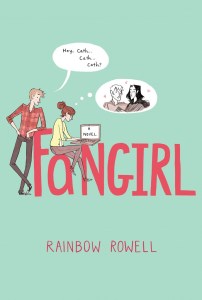Fangirl comes out in September this year. This is an early review on an ARC I received at BEA.
The Premise: It’s fall semester of freshman year, and Cather (aka Cath, the Less Adventurous Twin), feels lost amongst the other undergraduates. Her sister Wren has basically abandoned her (“if we do this together, people will treat us like we’re the same person”); her dad is home alone and Cath worries about that; her roommate Reagan is scary, and comes with the too-friendly Levi, who is in their room all the time. All Cath wants is to be left alone to work on her massively popular and novel length Simon and Baz fan fiction, Carry On, but college is getting in the way, and college is hard.
My Thoughts: Reading Fangirl is a comforting exercise. It’s one of those books where you open it’s pages and don’t notice the words because it takes no time to be engulfed. What’s more, nothing extraordinary may be happening on the page — moving into the dorms, briefly meeting a new roommate, saying goodbye to relatives, but there is an engrossing quality to how the characters reveal themselves through their everyday interactions. Well, sort of everyday. It’s not every day you move away from home and have your support system disappear. Titular character Cath thinks that college is hard, but I think the real issue is having to do it alone. Without her twin Wren at her side, Cath is too anxious to even go to the cafeteria by herself and lives off a stash of energy bars rather than find out where it is. She sits in the bathroom stalls quietly crying while the other girls in her hall are meeting one another. She is a quintessential introvert, her mind focused on an inner world, and who doesn’t like to get out of her comfort zone. Her sister may call her 3 year (now long distance) boyfriend an “end table”, but Cath is content with things being as they are.
You know where this is going. Cath can’t have the world stay safe and easy, and it won’t pause for her. Eventually she has to interact with others and be absorbed into new people’s orbits, and no matter what she does, other people and their lives affect hers. First (and most obvious) to impact her is her sister’s desertion, a strange flip in loyalty that leaves Cath floundering, but her sister is not the only family member that can rattle Cath. In college itself, Cath can’t avoid her roommate Reagan or the ubiquitous Levi, but then there’s also people from her classes like Nick from Creative Writing and the assortment of new acquaintances Cath picks up because she doesn’t want to be rude.
What I liked though, is that Cath got to stay herself while having to accept change. This is not a story with the moral that being introverted does you no good; it’s perfectly fine to be that way. In fact, one of my favorite parts of the story is Cath’s private world and her devotion to the Simon Snow series. Fan fiction is so popular now, it’s practically mainstream, but I don’t think I’ve ever heard of a story that embraces that subculture the way that Fangirl does. I don’t think of myself as part of that subculture, but even I know about ‘slash’ and ‘ships’, and there’s a certain joy in recognizing that Simon Snow is a riff on Harry Potter. Obviously (points at book blog), I get the whole fan and being into books thing, and any time Cath waxed poetic about characters she loves, or I read excerpts of Simon Snow or Cath’s fan fiction (placed like intermissions between chapters) and recognized elements, I grinned internally. I loved how this is important to Cath’s life and reflects as such in her conversations and relationships. Simon or simply, “stories” and “storytelling” is shared ground between Cath and others and there are a lot of scenes where it is the bridge between minds.
For all of Cath’s fangirl-ly-ness I connected with Cath while also not really connecting with her. The introverted, wanting-to-be-alone parts I could understand, but some of her more extreme coping mechanisms (like not bothering to find the cafeteria and essentially starving) I could not. It doesn’t matter though. What matters is that even if I didn’t always understand her, I always felt for Cath. It was the same for the secondary characters who didn’t always make the best choices but managed to make me care about them. This is what I want New Adult fiction to be–not a marketing term that means sex, but an extension of the coming-of-age tale into a post-adolescent bracket. Fangirl captures the awkward unsure side of tasting independence for the first time.
The last thing I want to say about Fangirl is that it is surprising. There were some things that I was expecting, but in the end, this story made it’s characters a lot more complicated than I thought they were going to be, and thus bucked all my predictions. This includes a blossoming romance that I thought was going to be smooth and sweet but defied me by being almost painfully uncertain instead (and was the better for it). If you think you know what’s going to happen after reading the first 50 pages, you’d probably be wrong. The plot is essentially about relationship growth, and every single relationship Cath began in safe little boxes and mushroomed out to be unique and nuanced and entirely different beasts from which they began.
Overall: Really, really, good. I found very little to complain about, and when I did, it was always a personal reaction to a character’s actions and no reflection on the actual writing or story — not worth going over in this review. And it actually seems to get better the more I reflect on it after finishing it. I hadn’t read anything by Rainbow Rowell before but it hasn’t missed my attention how many fans she has in the book blogging community. I waited in line for a copy of Fangirl because of the hype, and it was a very long wait. I can tell you now: it was utterly worth it.
P.S. How about that cover? I felt proud of myself for recognizing the artwork of gingerhaze.
Buy: Amazon | Powell’s | The Book Depository
Other reviews:
Not yet as far as I could tell (I searched amongst my book blog friends), but if I missed yours, let me know.
















